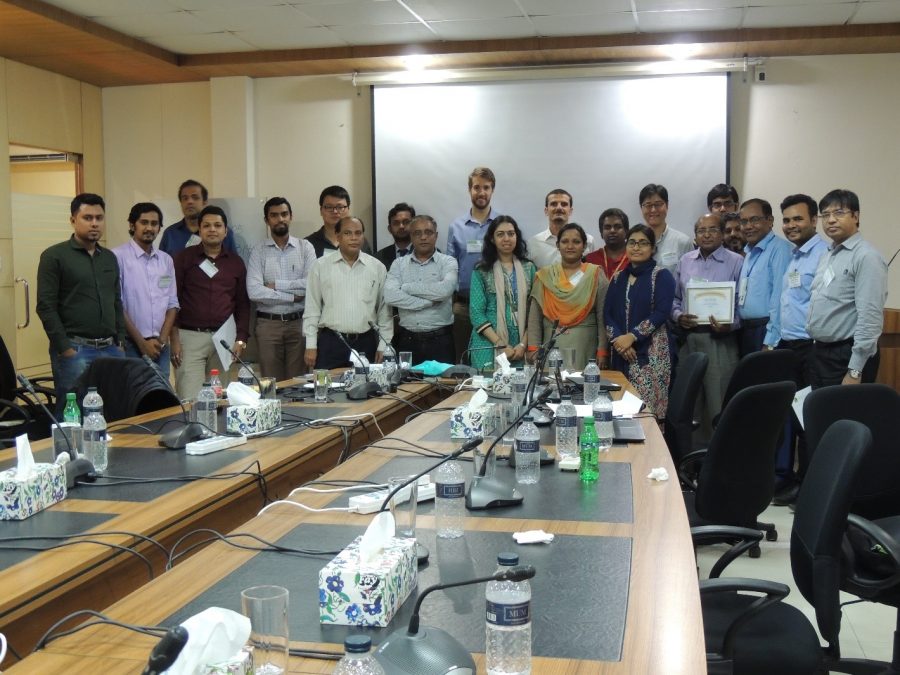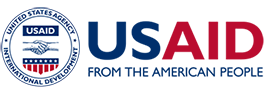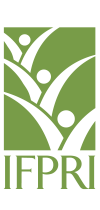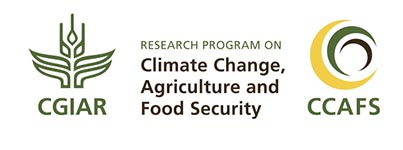To showcase the use of Feed-the-Future Open Agriculture and Nutrition Datasets in agricultural research and development, IFPRI's Gender, Climate Change and Nutrition Integration Initiative (GCAN) organized the second Feed the Future DATATHON to make household-level data more accessible and interoperable with other databases, and in particular with spatially explicit, biophysical data layers.
At this second event, which took place in Dhaka (Bangladesh) at the Agricultural Policy Support Unit on November 9, 2017 (the first event was held on August 11, 2017 at IFPRI-HQ in Washington, DC), the GCAN project team presented findings from the harmonized data in the country (Bangladesh Integrated Household Survey (BIHS) 2011/2012 and 2015, available on IFPRI Dataverse) across four key food security-relevant domains (climate, agriculture, nutrition, and gender) to about 30 participants.
The audience was very diverse, including participants from:
- ActionAid Bangladesh
- Agricultural Policy Support Unit
- American International University Bangladesh (AIUB)
- Bangladesh Agricultural University (BAU)
- Christian Commission for Development in Bangladesh
- Global Alliance for Improved Nutrition (GAIN)
- International Business & Technical Consultants, Inc. (IBTCI)
- International Centre for Diarrhoeal Disease Research (icddr,b)
- International Development Enterprises (iDE)
- Ministry of Education
- Netherlands Embassy
- North-South University
- Robotics Association of Bangladesh
- Tokai Corporation Ltd
- Winrock International
- WorldFish
The event promoted the analytical use of Feed the Future datasets with stimulating presentations, insights, and visualizations from participants, who during the course of the event generated their own analyses, infographics, and new research ideas.
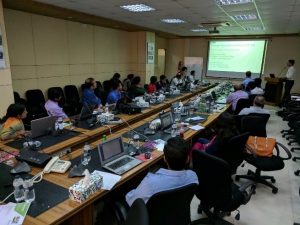
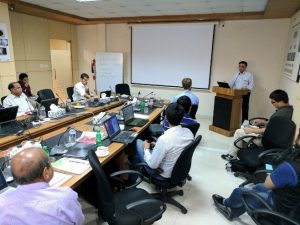
Moments from the event
Optional Training
From 10am to 12pm, three back-to-back training sessions were provided on:
- Introduction to microeconometrics and random sampling
- Hands-on examples on working with micro-data at the household-level using Stata; and
- Basic mapping techniques using Quantum GIS.
Welcome
Jawoo Koo welcomed participants and introduced the objectives of the event. Akhter Ahmed (IFPRI Head of Office, Bangladesh) framed the event and the GCAN project in the broader context of the Feed the Future initiative in Bangladesh, focusing on the unique characteristics of the BIHS dataset, followed by Carlo Azzarri’s short introduction on the Women’s Empowerment in Agriculture Index (WEAI).
Climate, Gender and Nutrition Data: The Bangladesh Feed the Future Standardized Dataset
Carlo Azzarri and Chris Gray from the GCAN team presented the datasets shared with the participants and provided three descriptive examples to illustrate the process and propose ideas to address the following three research topics:
- Weather variability and female farming
- Cropping patterns and dietary quality
- Women’s empowerment in agriculture index and nutritional outcomes
Data Analysis
The core of the event was a data competition, in which participants explored the Bangladesh data and identified new ways to visually display or statistically test relationships between gender, climate, and nutrition. While participants were busy working on their assignments, some lighting talks were presented featuring, among others, work by Md. Bappy Shahrier (WorldFish), Saiful Islam (Bangladesh Agricultural University), Arun Howlader (Robotics Association of Bangladesh), and GCAN team members. These talks also served to spark new ideas on how to better analyze, present and generate insights from large datasets.
Competition and Prizes
At the end of the event, three prizes were awarded for 1) best visualization, 2) best analysis and 3) best insight. The awards, three Sony Bluetooth speakers, went to Shajratul Alam (international centre for diarrhoeal disease research) for best presentation/analysis; to Shabbir Khan (North-South University) for best visualization, and Saiful Islam (Bangladesh Agricultural University) for best insight.
All three winners touched upon the core elements of the G-CCAN project. Shajratul presented a mapping analysis on water vulnerability in coastal Bangladesh, inspired by women’s role in household chores; Shabbir’s talk focused on the spatial variation of the WEAI in Bangladesh by division in relationship to child stunting and underweight using Tableau; and Saiful’s discussion delved deep into the correlation between market access and food security using econometric techniques. The judging committed also decided to reward the work by Atanu Chanda (GAIN) for his analysis on the impact of high temperature on child severe stunting.
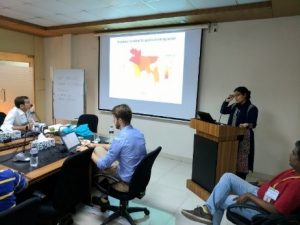
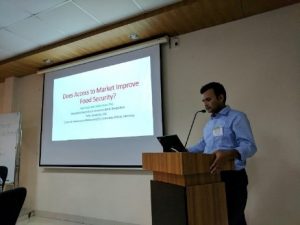
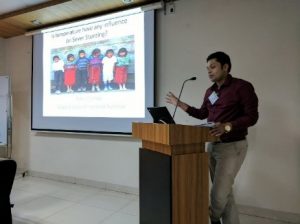
Photos of the winners’ presentations
Stay tuned for more exciting news about future Feed the Future DATATHONS!
